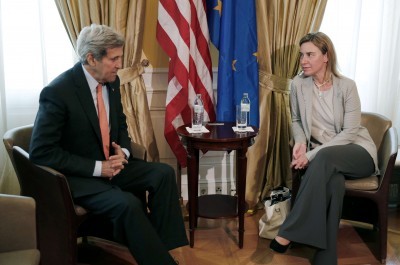-
Tips for becoming a good boxer - November 6, 2020
-
7 expert tips for making your hens night a memorable one - November 6, 2020
-
5 reasons to host your Christmas party on a cruise boat - November 6, 2020
-
What to do when you’re charged with a crime - November 6, 2020
-
Should you get one or multiple dogs? Here’s all you need to know - November 3, 2020
-
A Guide: How to Build Your Very Own Magic Mirror - February 14, 2019
-
Our Top Inspirational Baseball Stars - November 24, 2018
-
Five Tech Tools That Will Help You Turn Your Blog into a Business - November 24, 2018
-
How to Indulge on Vacation without Expanding Your Waist - November 9, 2018
-
5 Strategies for Businesses to Appeal to Today’s Increasingly Mobile-Crazed Customers - November 9, 2018
Iran, US claim progress in latest round of n-talks
“I am here to get a final deal, and I think we can”, Javad Zarif, Iran’s Foreign Minister and Chief negotiator, told reporters in Vienna.
Advertisement
“With the deadline now extended into next week on finding a comprehensive agreement on Tehran’s nuclear programme, the markets will monitor closely the outcome of the negotiations as Iran sits on the fourth-largest oil reserves and second-largest gas reserves in the world”, said Sanjeev Gupta, head of the Asia-Pacific oil and gas practice at Ernst and Young.
And Britain’s foreign secretary, Philip Hammond, confirmed to the press there would be movement over several days.
France’s foreign minister, Laurent Fabius, left Vienna on Thursday after a day of meetings.
Major-power foreign ministers and the United Nations atomic watchdog chief were set to launch a fresh two-pronged push today to nail down an elusive nuclear deal with Iran in a sixth day of high-stakes diplomatic poker. “[W]e are careful about the independence of the IAEA and their autonomy, and they’re working together with us but not for us and make their own decisions”, the official said.
The unnamed official urged negotiators to be “realistic”, and said the worldwide Atomic Energy Agency’s standard rules governing access to government information, sites of interest and scientists should be sufficient to ensure that Iran’s program is exclusively for peaceful purposes.
Now, BBC reports that all parties agreed to extend the deadline to July 7th.
However, the official highlighted a major difference between Iran and the other powers when he said Tehran expected that key global sanctions would be “terminated”.
The report said more than four tons of the enriched uranium had been fed into a pipeline that ends with conversion of it into oxide, which is much less likely to be used to make nuclear arms.
On his part, Amano expressed his understanding of Iran’s concerns and sensitivities in its cooperation with the IAEA.
But Hammond stressed: “The work goes on”.
“What is important is that both sides are treated more or less equally”, he said.
Rouhani reportedly told Amano he was convinced the remaining issues between Iran and the IAEA could be resolved quickly. “You’re going to see over the next few days ministers coming and ministers going to maintain the momentum of these discussions”. It also wants the lifting of sanctions to be contingent on “ongoing verification” of Iranian compliance, a long-term moratorium on Iranian nuclear activity, complete dismantling of Iran’s existing nuclear infrastructure and an accounting by Iran of past nuclear weapons development.
The U.S. leader’s remarks appeared to be in response to the hard-line statements made by Iran’s Supreme Leader Ayatollah Ali Khamenei, who put a stumbling block in the course of the negotiations by ruling out either a stoppage of sensitive nuclear work or opening military sites to inspectors.
The diplomat’s comments, which came as IAEA director general Yukiya Amano convened a meeting with Iranian President Hassan Rouhani in Tehran, suggest they may be able to bridge the gap. The IAEA had no immediate readout.
Advertisement
If Iran is facing the re-imposition of penalties, and the USA and its partners don’t uphold their commitments to provide economic relief, he said “Iran has the right to go back to its program as it wishes”.





























